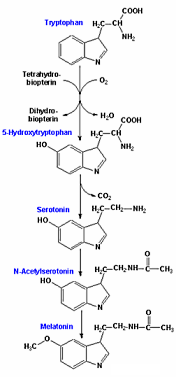|
Melatonin keeps brain cells young
The brain cells of mice don't age if the mice are given melatonin in their drinking water, write researchers from the Universidad de Granada, Spain, in the Journal of Pineal Research. The researchers gave their lab animals a hefty dose of 10 mg per kg bodyweight.
Melatonin
Melatonin is a hormone that the pineal gland produces when there is no daylight. The diagram here shows it biosynthesis. Melatonin induces sleepiness and helps the body to prepare for the night time. And because melatonin is also an antioxidant and can protect genetic material from damage, researchers have been studying the hormone for years.
Study
The same is true for the Spaniards, who gave melatonin to mice, because they age quickly. The mice were given a placebo for 5 or 10 months [p5v or p10v] or melatonin for 10 months [p10m]. The treatment started immediately at birth. After 5 and 10 months of placebo treatment, and after 10 months of melatonin, the researchers examined the mitochondria in the mice's brain cells. Mitochondria are the cells' energy generators. In the process of ageing, brain cells' functioning starts to deteriorate, which is why older people's brains often function less well than the brains of young people.
Results
The researchers noticed that, in the mitochrondria of the mice that had not had melatonin, the production of endogenous antioxidants declined increasingly as the animals aged. The figure below shows what happened to the glutathione peroxidase. Melatonin had almost the same effect on glutathione reductase as well.
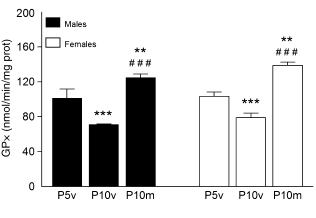
The researchers also found more oxidised fats in the membranes of the mitochondria in the older mice. Melatonin inhibited this increase. The concentration of the free radical NO also increased as the mice aged – and once again melatonin inhibited this increase.
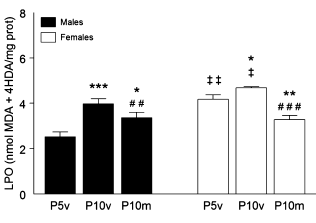
In the mitochondria there are four important enzymes that generate energy together. These enzymes and the molecules that help them are referred to as Complex 1, 2, 3 and 4 by scientists. Complex 1, 2 and 3 started to work less well as the mice aged – and, again, melatonin improved this situation.
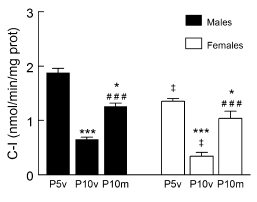
The energy that the mitochondria produce is released in the form of ATP. And, you guessed it: ageing leads to a decrease in ATP production, except in the mice that were given melatonin.
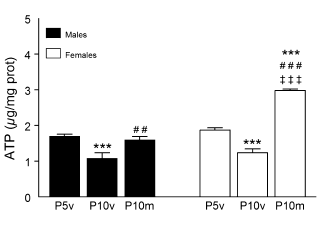
Conclusion
"Melatonin showed marked beneficial effects against brain mitochondrial dysfunction with age", the Spaniards conclude in their article. "These effects, and the fact that melatonin virtually lacks toxicity even at large doses, supports its clinical use in preventing the impairments of aging."
Source:
J Pineal Res. 2009 Sep; 47(2):192-200.
|

